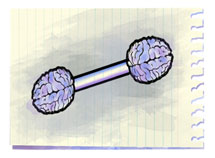Exercise and Neurogenesis
Perhaps the most dramatic form of neuroplasticity in the adult brain is the birth of new neurons, or neurogenesis—another phenomenon firmly believed to be impossible until the 1960s. Although scientists now generally acknowledge that neurogenesis occurs, the how and why of this process remain unclear. That is something that Linda Overstreet-Wadiche, Ph.D., an associate professor of neurobiology, aims to remedy.
 Learning more about neurogenesis could provide new clues about treating many different diseases and shed light on the mysteries of learning and memory. People with epilepsy show increased neurogenesis, for example, while the process slows in the brains of patients with neurodegenerative diseases, Overstreet-Wadiche says.
Learning more about neurogenesis could provide new clues about treating many different diseases and shed light on the mysteries of learning and memory. People with epilepsy show increased neurogenesis, for example, while the process slows in the brains of patients with neurodegenerative diseases, Overstreet-Wadiche says.
Using special fluorescent dyes, researchers in her lab have tracked the development of stem cells into mature neurons in the dentate gyrus, a region of the brain involved in pattern separation. Overstreet-Wadiche explains pattern separation as the ability to identify small differences in the environment. “You need to discriminate things in order to learn something, so the dentate gyrus contributes to learning and memory,” she says.
Once the new cells mature, which can take months in the adult brain, they are identical to the neurons created during infancy and childhood. So what are these cells born to do? “One of the ideas proposed is that this process allows the whole system to respond to some cognitive demand,” Overstreet-Wadiche says. The cells that survive during enrichment may do so because they received input, “so maybe they’re primed to respond the next time they see it.”
In study published in 2011 in the journal Nature Neuroscience, Overstreet-Wadiche’s lab identified one specific type of cell, known as an interneuron, that appears to communicate with the developing neurons. “If activity in the network is being translated to the newborn cell through that cell type, then you might expect that in some diseases, or in situations where you have changes in neurogenesis, that maybe something happens with that interneuron first.”
Just about anything that alters neural activity in the dentate gyrus will affect neurogenesis, Overstreet-Wadiche adds. Studies have shown that exercise and environmental enrichment, such as learning a new language, enhance neurogenesis, while stress has been shown to reduce it.
In fact, “it’s unambiguous that environmental enrichment and exercise improve cognitive function,” Sweatt says. If you want to improve your brain, “you should go do that, right now.”